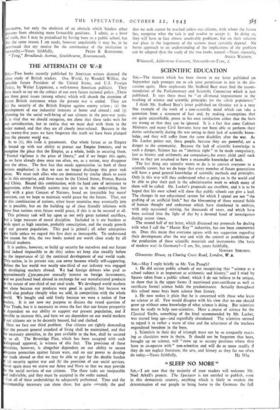SIR, —May I reply briefly to Mr. Van Praagh?
r. He did accuse public schools of not recognising that " science as a school subject is as important as arithmetic and history," and I tried by figures taken from a public school, which I do not believe to be unique, to show that in the upper forms (I mentioned post-certificate as well as certificate forms) science holds the predominance. Actually throughout this school more boys learn science than history.
2. He now makes it plain that he is concerned with those who learn no science at all. Few would disagree with his view that no one should grow up without some knowledge of what science is doing. But scientists must be ready to help non-scientists. Here a course of science for the Classical Sixths, something of the kind recommended by Mr. Locket, was started long ago—and regretfully abandoned. The scientists seemed to regard it as rather a waste of time and the reluctance of the teachers engendered boredom in the boys.
3. Scientists in their day of triumph must not be so arrogantly exact-, ing as classicists were in theirs. It should not be forgotten that boys, brought up on science, will " grow up to occupy positions where they have to co-operate with" non-scientists and will do so more readily if they do not neglect literature, the arts, and history as they far too often


























 Previous page
Previous page